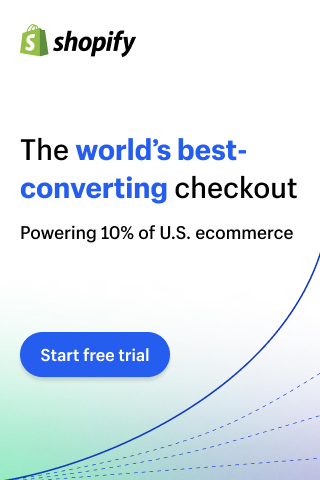Shopify is great and all. But if you’re looking for an alternative, it’s because there’s something that doesn’t work for you.
You probably don’t want transaction fees to cut out your profits, or there’s an SEO tactic you can’t implement because you can’t touch their proprietary code, or your catalog is too complex for Shopify’s platform.
You see, despite Shopify being the most used ecommerce platform powering more than 2,75 million websites, it can’t be a one-size-fits-all solution.
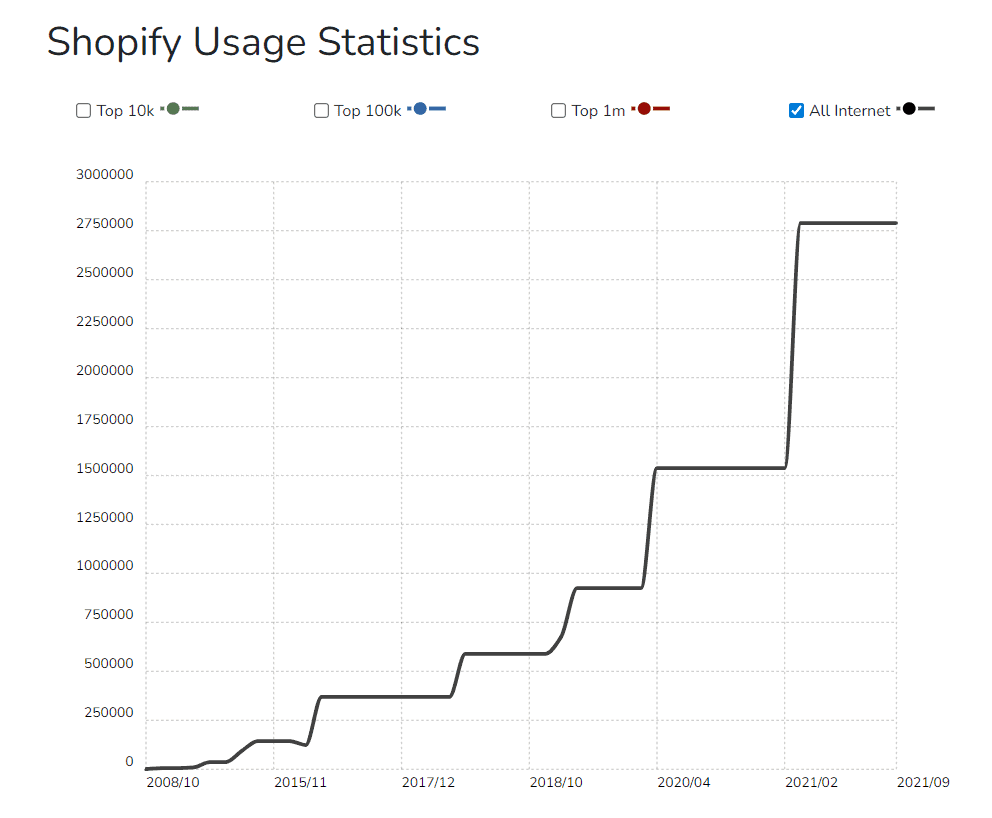
Thankfully, there’re plenty of Shopify alternatives in the market right now. And in this post, you’ll find the best-reviewed ecommerce platforms for your business.
Why Would You Not Use Shopify?
Shopify is one of the best ecommerce platforms, especially for beginner business owners who don’t want to deal with technical stuff like coding, installing programs, and complex features.
And that makes sense according to Segun—a web developer who has migrated plenty of websites from Shopify—who says:
“Shopify is the easiest E-Commerce platform out there. I think it’s the easiest website builder to use, period. You have to know what you’re doing to want to leave Shopify for other platforms.”
These benefits aren’t without their flaws. Making it beginner-friendly means it will be harder to implement more unique features. And it won’t have the flexibility to adjust to specific niches that require a more elaborate design. As Segun elaborates:
“Shopify is best suited for small to medium scale ecommerce businesses ($500 a month – $5Mil a month). Anything higher and custom solutions are preferred.”
There are a few reasons Shopify wouldn’t be a fit for your business:
- Customization is limited to the platform and apps in their store.
- There’re transaction fees when using different payment methods.
- Very unfriendly for B2B businesses. As it’s built with B2C stores in mind.
- Your catalog is limited to 100 SKUs and three options per product (cheaper plans), which can fall short if your niche requires a wider variety of products.
- Despite having excellent SEO performance. It lacks customization for more nuanced SEO tactics.
So if you’re hesitant to use Shopify for your next project, no worries, there’re plenty of alternatives that will fit with your business too.
Also, you can read our complete Shopify review for more insight.
Top 9 Ecommerce Platform Alternatives for Shopify
1. BigCommerce
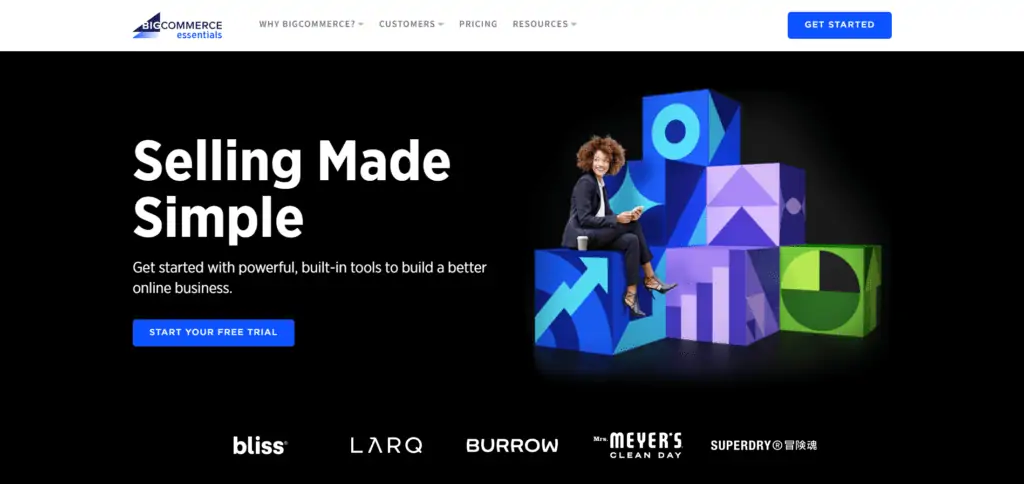
Bigcommerce—just like Shopify—is an all-in-one hosted ecommerce platform where you don’t have to worry about coding or extra-technical stuff to build your online store.
And more than an ecommerce site builder, Bigcommerce has an excellent store management capacity to deal with large catalogs, give accurate shipping dates, discounting tools, inventory management, and so much more.
Compared to Shopify, Bigcommerce isn’t too different in terms of customization. However, it does have better capabilities when it comes to managing products, catalogs, orders, shipping (it integrates with ShipperHQ), and it even includes a CRM.
Pros:
- Fully hosted and requires no maintenance or a separate hosting service.
- Superior to Shopify when it comes to managing your business.
- Unless you’re in the cheapest plan, Bigcommerce won’t charge transaction fees for using different payment methods.
- Integrates with Amazon, eBay, and Facebook marketplace.
- Can be used with WordPress.
- There’s a 24/7 support team and helpful learning guides.
Cons:
- Website themes have higher prices. So having a beautiful website will cost you money.
- Customization is not as flexible as Shopify.
- It’s a bit more complex than Shopify when setting up your website and designing.
Conclusion: While Shopify is the #1 recommended platform for starters. Bigcommerce is better suited for those who aim bigger and want to scale their business fast.
As mentioned earlier, Bigcommerce has solid tools for managing your business, so it scales very well when you start expanding your catalog, employees, and customer size.
Check our complete BigCommerce review.
2. Wix

Wix is a user-friendly platform that allows you to create a high-quality store with no technical skills. Thanks to its drag-and-drop website editor, you can customize your site completely.
Different from Shopify, Wix is made to create any type of website in general—meaning that adding the ecommerce components to your site is optional in the platform.
It also takes care of the hosting and backend part of your website. So you don’t have to worry about maintenance, HTML code, or having to keep your tools up-to-date.
Wix’s greatest strength is its customization capabilities coming from its powerful website builder and the incredible templates that are available to you—giving you complete control of your online store’s design and functionalities.
Pros
- Price is cheaper than Shopify. And offers a free plan where you can test things out and see if it fits your needs.
- Its website builder and templates give you full control over website looks.
- Has an HTML5 editor for complete customization.
- It’s fully hosted, no need to use a domain registrar or a hosting service.
- Supports multiple payment methods without charging fees.
Cons
- It’s not made specifically for ecommerce businesses. Features like product attributes aren’t too flexible.
- Not great for B2B businesses.
- Too many templates and design options might feel overwhelming.
Conclusion: Wix is a better alternative to Shopify if you want to have total control over your store’s design and functionalities. As it offers you the tools to not only handle everything on your website but also makes it easy for you if you don’t know how to code.
Check our complete Wix review.
3. Squarespace

Like Shopify, Squarespace is an all-in-one website builder that fits beginners and experts alike. The platform makes it so anyone can create any type of website while offering more advanced tools for designing, SEO, and analytics.
And like most website platforms, you don’t have to think about hosting, domains, or your HTML code to run your ecommerce business with Squarespace.
What breaks Squarespace apart from the competition is probably its online marketing features. Such as a blogging module, an SEO-friendly structure, connection with social accounts, social media snippets, marketing analytics, and integration with Amazon/Facebook Pixel/Google Ads.
Pros:
- It is fully hosted—no need to know about domains, servers, or maintenance.
- Well-made website templates and design customization.
- Great tools for online marketing, SEO, and analytics.
- Zero transaction fees.
- Integrates with third-party tools for additional capabilities.
- Unlimited product catalogs.
- More affordable than Shopify’s cheapest plan.
Cons:
- The platform is made for websites in general. Not for ecommerce exclusively.
- Can’t contact the support team via phone call in cases where immediate response is needed.
- Design tools can be so in-depth that they can get overwhelming for new users.
Conclusion: As a general website builder, Squarespace can only offer so much when it comes to ecommerce functionalities.
But considering its excellent templates and design tools, it can be an incredible platform for businesses in visual-heavy markets like fashion, makeup, or home decoration. So you can create a visually stunning website that resembles the quality of your products.
Check our complete Squarespace review.
4. WooCommerce
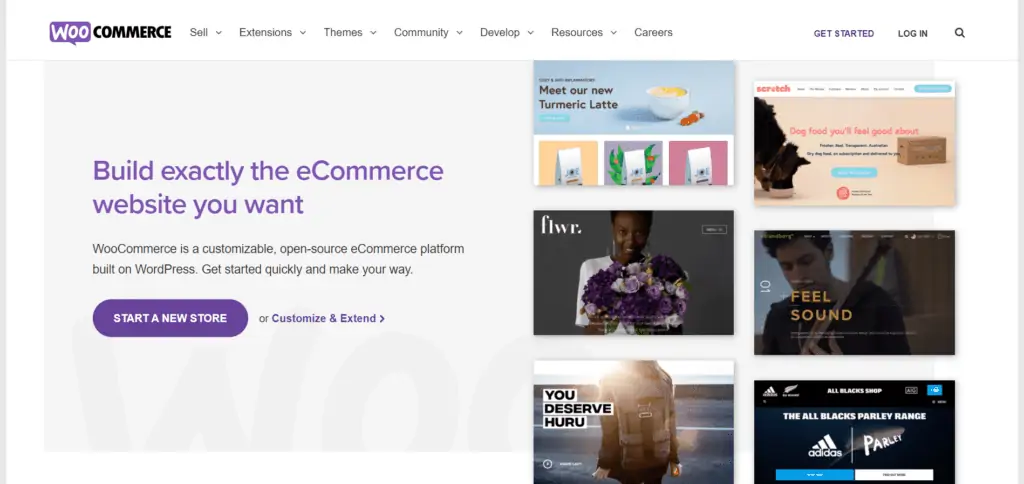
WooCommerce is an open-source WordPress app that works as an ecommerce platform. And like Shopify, you can sell products and build your online store with it.
The fact that it’s open-source means it’s free to use, and you can customize it as much as you want. The code is open for developers to edit it as much as they like—as long as it stays compatible with WordPress.
What’s more, you don’t need to learn how to code since you can install third-party plugins for almost any feature you need.
However—and despite being free—you still need to have WordPress installed, pay for high-quality web hosting, and do some maintenance work to keep your plugins all up-to-date.
Pros:
- It’s free.
- It’s an excellent option for people who want to use WordPress.
- Highly customizable since it’s open-source.
- Integrates with almost any app.
- There’s an active community of experts and developers who keep updating it.
- The platform is made for ecommerce businesses. So it’s complete in features and options.
Cons:
- Requires web hosting and WordPress, which isn’t free.
- While most plugins are free, the top-quality tools are premium.
- You’ll need to work with a developer if you want to make the most out of the platform (for customizing the code, adding specific plugins, etc.)
Conclusion: Woocommerce is the perfect fit for your business if you want deep customization over your site and feel comfortable using WordPress.
Nothing about Woocommerce is hard to learn. But remember that it’s not an all-in-one solution like Shopify, where you have everything you need at your disposal.
Check our complete Woocommerce review.
5. OpenCart
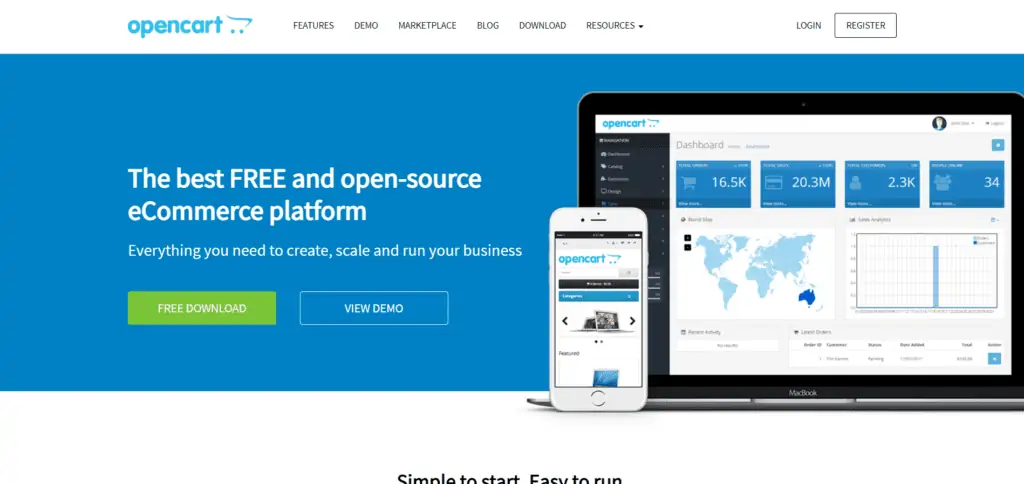
OpenCart is an open-source ecommerce platform that offers everything you need to set up an online store. Which is convenient for those who want a highly customizable platform for their business.
Unlike Woocommerce, you don’t need WordPress to set it up. But you need to own your web server (pay hosting, domain, etc.), which must meet a few requirements like being in PHP, having curl enabled, and getting a database.
On the other hand, it also means that it is entirely free. And you don’t need to code to use it as long as you follow the proper guidance, plus you can customize it by installing some of the infinite amounts of third-party tools built for it.
Pros:
- It’s open-source, meaning it’s completely free and can be modified as you want.
- It integrates with an ocean of third-party tools to help you integrate wanted features like SEO, blogs, web personalization, and so on.
- Has a large community that keeps the platform up-to-date and provides support.
- Scales well, as it offers unlimited categories, products, languages, product reviews, currencies, tax rates, and more.
Cons:
- Despite being open source and customizable. It can be challenging without technical knowledge, and you’ll need a developer to modify its internal code to your liking.
- The platform is not SEO-friendly unless you install the right plugins.
- Even if the platform is free, you’ll still need to pay for high-quality themes and apps to optimize it and scale.
- Lacks marketing capabilities like social, blogs, analytics, lead gen, etc.
- The platform is slower than the competition. Requires work to make it faster.
Conclusion: OpenCart is a great option when you want to own control over your business without relying on one entity like Shopify or WordPress.
Since it’s open-source, you can use it to get started with less money while relying on third-party apps. And then hire developers, designers, and SEO specialists to scale your business with an optimal backend, design, and content.
Check our complete OpenCart review.
6. Big Cartel
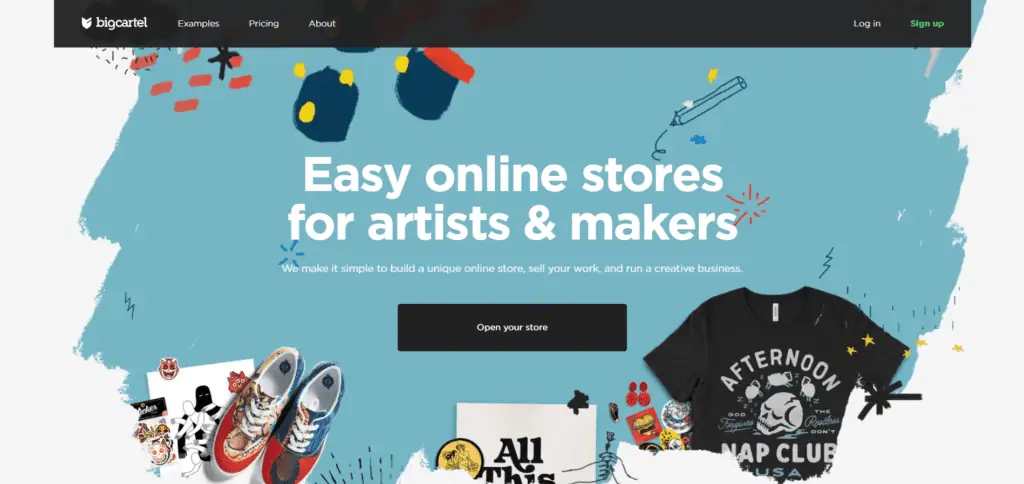
Big Cartel is a “lightweight” ecommerce platform targeted to small businesses and creatives such as artists, painters, woodworkers, etc.
The platform helps you set up an online store without stress or complex features. It lets you create a visually appealing website, sell products, manage orders, and get payments in the simplest of ways.
However, having no learning curve means that it will lack any advanced feature that you might need in the future if you plan on expanding your catalog or growing your customers.
Pros:
- It’s straightforward. Anyone can open an online store.
- It’s very affordable and has a freemium plan.
- Despite being simple, it doesn’t compromise the quality of their templates. They all look modern and engaging.
- It lets you edit the site’s HTML, CSS, and Javascript code without issues (you’d need to know code).
- The platform is SEO-friendly and has a high-quality backend.
- Integrates with Facebook Marketplace.
- Supports discount codes.
- No transaction fees.
Cons:
- Lacks advanced features for fast-growing businesses.
- Even basic features like a search function are not supported because the platform works for stores with smaller catalogs that don’t need to expand.
- Payments are limited to Stripe and Paypal.
- Overall less flexibility than most platforms. You’d have to tweak the website code to customize your site further.
Conclusion: Both Big Cartel and Shopify are great options for beginners/ small sellers.
But different from Shopify, Big Cartel is made for the portion of online stores that don’t need to scale. Creative sellers offering hand-made products or art would benefit the most from this platform.
Check our complete Big Cartel review.
7. Volusion
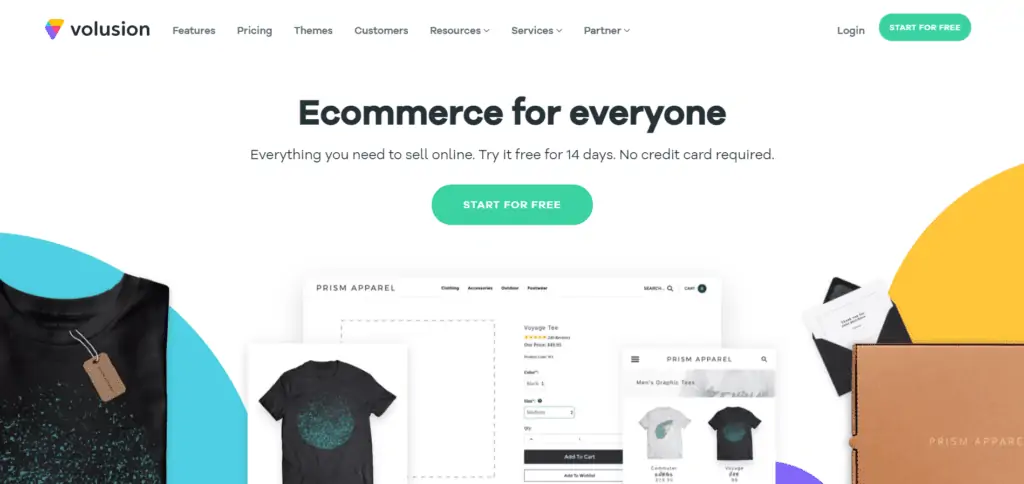
Volusion is an all-in-one ecommerce platform like Shopify. So you don’t have to download or install anything to start building your online store. All you need to do is sign up and pick your template.
It covers all the features you need to launch your ecommerce business and sell products online. Including order fulfillment, search function, text-rich product pages, SEO tools, marketplace integrations (Amazon, Facebook, eBay, etc.), and more.
Volusion lets you fit more products in your catalog and satisfies those business owners who need more advanced features—making it a great choice to start and grow your store.
Pros:
- It is fully hosted—no need to pay for any other service.
- Customer support is available 24/7.
- The platform is fully customizable and user-friendly.
- Offers many high-quality templates.
- Great product management tools like its top-notch inventory integration.
- Includes marketing features for SEO, social media, and marketplace selling.
- Allows for a more extensive and more diverse catalog than Shopify.
Cons:
- Has a complicated fee structure for fees and secondary costs like bandwidth usage. Making it a more expensive choice than you’d think.
- Forces you to pay for your SSL certificate and integrate it into your site. Which adds to the additional costs of using the platform.
- Despite having beautiful templates. Premium templates cost hundreds of dollars if you want to change your theme.
Conclusion: Volusion can be a high-quality alternative for Shopify if you have the extra funds to pay for the additional costs.
The platform, in general, is solid and even offers more than Shopify when it comes to catalog diversity. So if you don’t mind adding the extra steps and money to use the platform, it can be a great alternative.
8. 3DCart
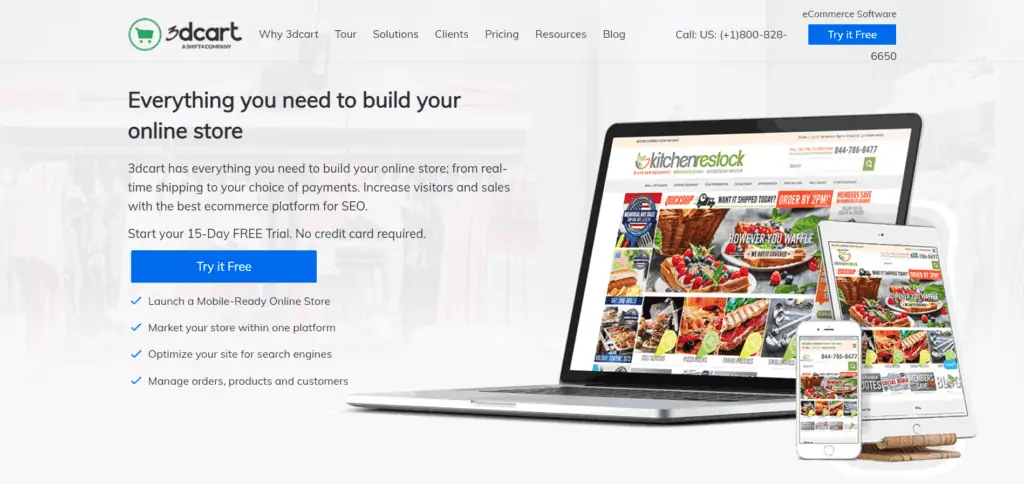
3DCart is a more advanced platform that offers powerful features to build, launch, and operate your online store and make it grow.
Like Shopify, it’s fully hosted and you don’t need to worry about the server side of the business. However, they differ on the level of customization and more complex capabilities that 3DCart does provide, making it the best option for those who are more experienced in the game and know how to handle them.
Despite offering more advanced features, the platform is easy to use and customize. You don’t require any technical skills whatsoever since all the “complexity” is on the management/marketing side of the business rather than the code.
Pros:
- It’s a comprehensive platform. Offering strong management and marketing capabilities like multi-channel retail, marketplace integrations, SEO, customer reviews, and more.
- Scales excellently with unlimited products, upsells/cross-sells features, categories, SKUs, and more.
- Chat and phone technical support that’s available 24/7.
- Multiple payment options, flexible checkout, and no transaction fees.
Cons:
- It’s harder to learn than other platforms.
- The free templates aren’t as attractive as Shopify’s. You have to pay for the premium options to reach the highest standards.
- It charges you for additional features. So it can become pricier than you’d have expected.
Conclusion: 3DCart is an excellent solution for experienced store owners who want to start a new project and grow it as fast as possible. As the platform will offer you the tools and capabilities needed for it.
Check our complete 3DCart review.
9. Magento
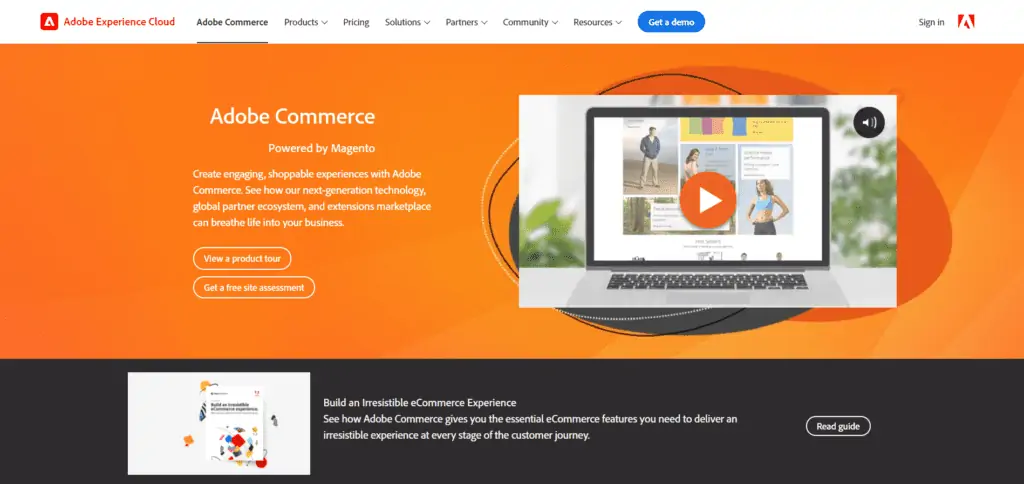
If you’re a fresh newbie in the ecommerce world, then Magento is not the best place to start.
You see, Magento is highly popular and it’s powering more than 250,000 stores worldwide right now. And it’s targeted to both small businesses and enterprise-level, offering a free platform for the former and a fully-hosted (but very expensive) service for the latter.
With Magento, you can do almost anything to grow your business given that you have the knowledge and the funds to make it happen. Plus, it’s easy to hire Magento professionals that can help you grow and scale your business.
Pros:
- It’s a complete solution for those who need full-stack capabilities to scale a business as fast as possible.
- Despite having unlimited features, the platform is easy to use for daily tasks and management.
- Scales perfectly, you can increase your number of products and customers as high as you can.
- It’s free to get started as long as you own your web server.
- It’s widely used and has an active community of developers willing to help.
- Finding new hires specializing in Magento is way easier than with other platforms.
Cons:
- It’s too complicated for small businesses.
- Requires technical knowledge to make the most out of the platform, including essentials like SEO, marketing, and analytics.
- The free plan requires hosting, which can be a bottleneck on its scalability.
- It gets expensive when it comes to the development and maintenance costs of the website. You either hire a team to handle your business or pay five figures per year for the enterprise plan.
Conclusion: Magento is almost the opposite of Shopify. Instead of being highly accessible, easy to use, and done-for-you, Magento is a high-investment, high-reward platform for those who have the funds and expertise to scale a validated idea and create a solid, fast-growing ecommerce business.
Check our complete Magento review.
Shopify Shouldn’t Be Hard to Replace
Choosing the right ecommerce platform is not a small deal. Your business will rely on it to even exist.
Shopify is the most used platform for multiple reasons, even if it’s not a one-size-fits-all solution.
Still, no alternative will beat Shopify in all aspects—they’ll just cover Shopify’s weaknesses.
And since we’ve covered nine alternatives with different pros and disadvantages, it’s almost impossible that you won’t find something that fits your needs.
So ask yourself: What are your business needs? Why wouldn’t you use Shopify? And which platforms will provide what Shopify lacks for me?
Don’t spend more time choosing the right ecommerce platform than you have to.
